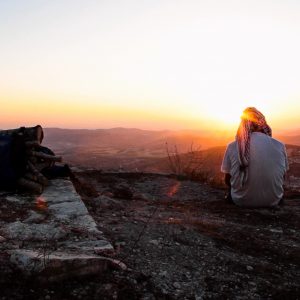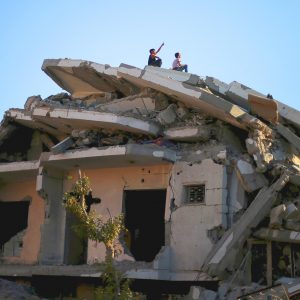New bill wants SA to halt trade with Israel
Israel’s export of weapons to the United States and South Africa – and a proposed law to stop this and other trades – was discussed at this year’s Israeli Apartheid Week.
Author:
25 March 2021

Member of Parliament Mandla Mandela has endorsed a bill that would make it illegal for the South African government and private sector to have trade or diplomatic ties with Israel.
The Implementation and Protection of Palestinian Solidarity Rights Bill is a citizen’s bill, written by human rights attorney Ziyaad Patel and endorsed by Mandela, Nelson Mandela’s grandson, who is one of the ruling party’s parliamentarians.
The bill was discussed at an online seminar on 20 March organised by the South African Boycott, Divestment and Sanctions (BDS) Coalition as part of Israeli Apartheid Week. The initiative launched in 2004 and features annual global protests and seminars to build support for the global BDS campaign and highlight Israel’s apartheid policies against Palestinians.
Mandela said the bill was a “long overdue and worthy contribution to our collective efforts to mobilise all sectors of society towards our mutual goals of ending the occupation, right of return of all Palestinian refugees, freeing of all political prisoners, stopping expansion of illegal settlement and securing the right to free political determination for all citizens of occupied Palestine”.
Related article:
A summary of the bill says it aims to “construct a legally enabling framework which converts the political rhetoric of South Africa’s governing political party, the African National Congress and/or other such political parties into tangible support for the international Palestinian Solidarity Intifada”.
While the “BDS movement has breathed new life and impetus into the struggle for Palestine”, there were still “contradictions and failures” in the South African government’s approach to Palestine, such as “the denial of visa free status to Palestinians whilst apartheid Israel enjoys such privilege, the security status of [Israeli national airline] El Al at OR Tambo International Airport and … the movement of financial services and goods to apartheid Israel”, said Mandela.
“I am in full support of the draft bill. BDS is the most powerful tool in the hands of the Palestinian people and of activists in the solidarity movement,” he added.
The willingness of governments
Some municipalities in the United States and Europe – and many global institutions such as the Teachers Insurance and Annuity Association of America and College Retirement Equities Fund, and the Presbyterian Church in the US – have divested from companies such as Caterpillar, Veolia and G4 Security Services over the past eight years because of their support for the Israeli military occupation of Palestine.
But sanctions against Israel are dependent on the willingness of individual governments.
“We know that the Palestinian cause is at a tipping point where Palestinians are undergoing an incremental genocide. South Africa sits with a huge responsibility and we need to be taking the Palestinian cause to the next level,” said Patel.

The proposed act would be a “state response by South Africa forcing Israel to alter its current policies violating fundamental Palestinian human rights”. If the law is passed, the government would be legally compelled to establish boycotts, trade divestment, economic sanctions and a lawfare council that would agree a deadline by which BDS and the breaking of diplomatic, trade and economic relations with Israel would have to take place.
The council would be a statutory regulatory body made up of 30 politicians, lawyers and activists, and nine attorneys. The bill also proposes a set of fines and jail terms – from R300 000 to five years in prison – for individuals or businesses who continue to trade with Israel.
Weapons tests
Another Israeli Apartheid Week seminar organised by South African Jews for a Free Palestine discussed how the Israeli weapons trade affects activists and protesters in South Africa and the US.
The organisation’s research has shown that “Israel perfects its use of the skunk water cannon [highly stinky water] on Palestinian protesters in the West Bank and then the South African Police Service uses this on student protesters in South Africa,” said Rosa Manoim of South African Jews for a Free Palestine.
Related article:
Speaking at the same seminar, Khury Petersen-Smith, a founding member of Black 4 Palestine in the US, said every major police department in the US has some collaboration with the Israeli state. The police used the same “skunk truck” that was developed in Israel and used in South Africa in St Louis, Missouri, to put down the Ferguson protests in 2014, following the police murder of Michael Brown, and in the city of Boston. Many colleges and universities had their own police departments that trained with Israel, as did the Boston airport and transit police, said Petersen-Smith.
“Policing in the US is so extensive, which is why our freedom really is bound together. It is the case that when Palestinians fight for their freedom and score victories against Israeli violence, that is connected with us fighting for our freedom in this country against the myriad ways that we are policed.”
Related article:
Israel’s state-owned weapons companies specialise in “homeland security weaponry … the kind of technology that is needed to control a civilian population”, said German academic and writer Shir Hever. “This is used in Belarus, Hong Kong by the Chinese police, in Myanmar against the Rohingya and in many other places around the world where there is very severe inequality and people are rising up to fight against that injustice.”
Hever said Israel first tested the weapons on Palestinians. “Every two years or so, the Israeli military would invade the Gaza Strip … bombarding whole neighbourhoods and killing thousands of people and then waiting two years for the Palestinians to try to recover a little bit, rebuild and then invade again. Every time they would have an arms fair immediately after the invasion to say “these are the new technologies that we have used in this invasion and now you can buy them as well,” said Hever.



